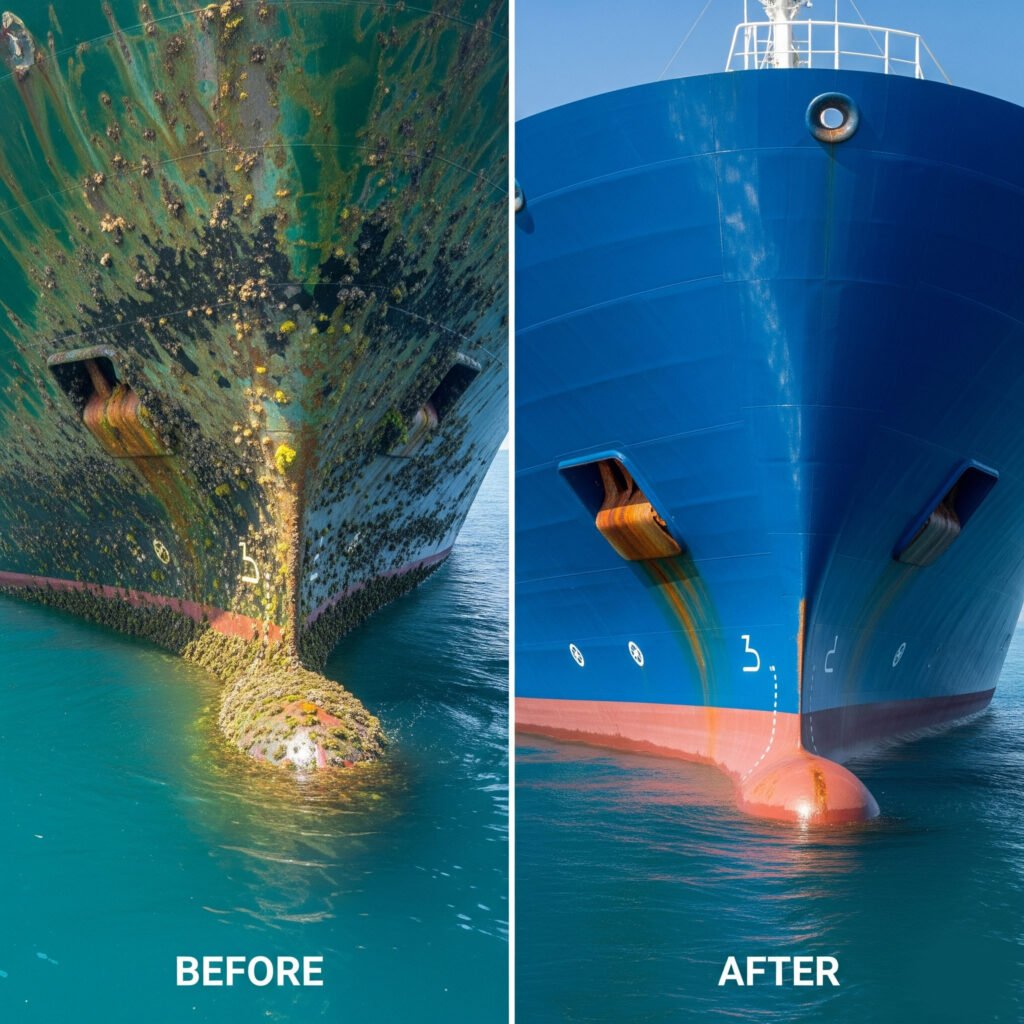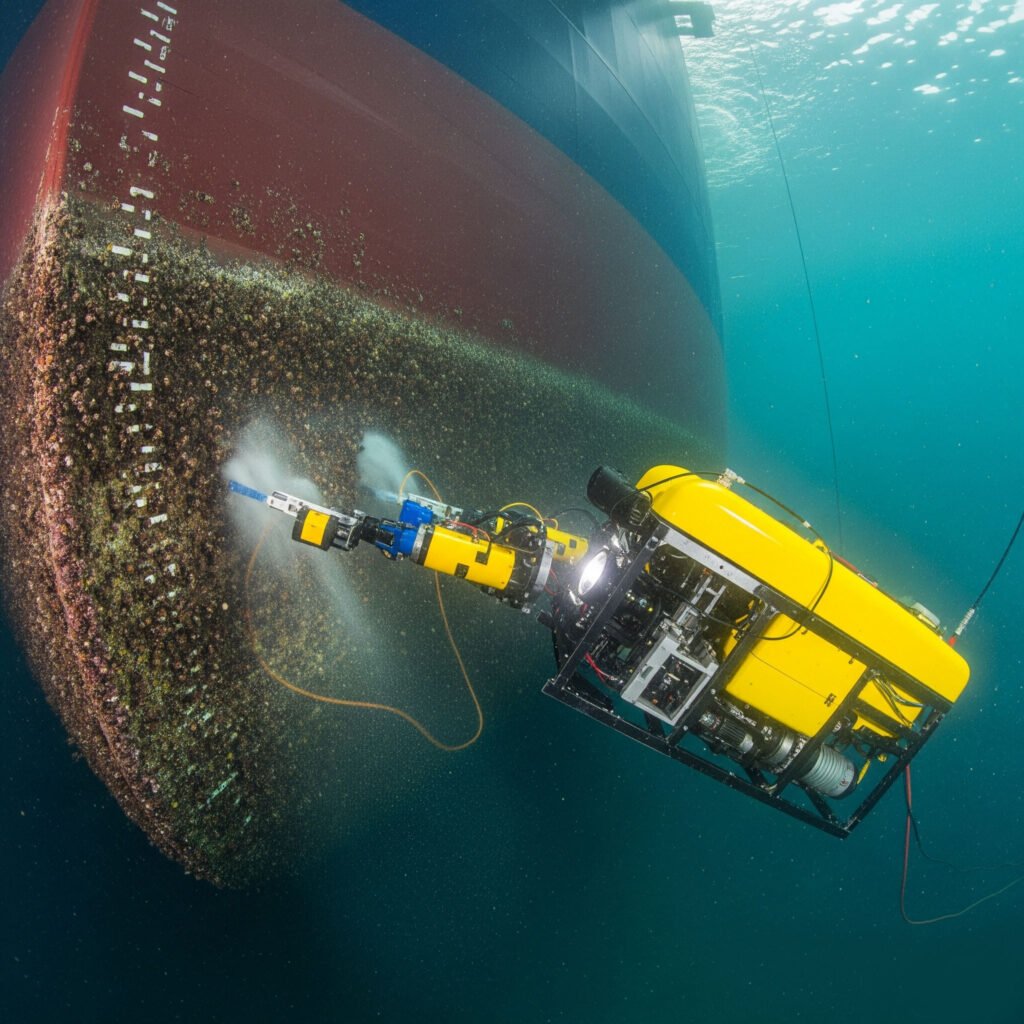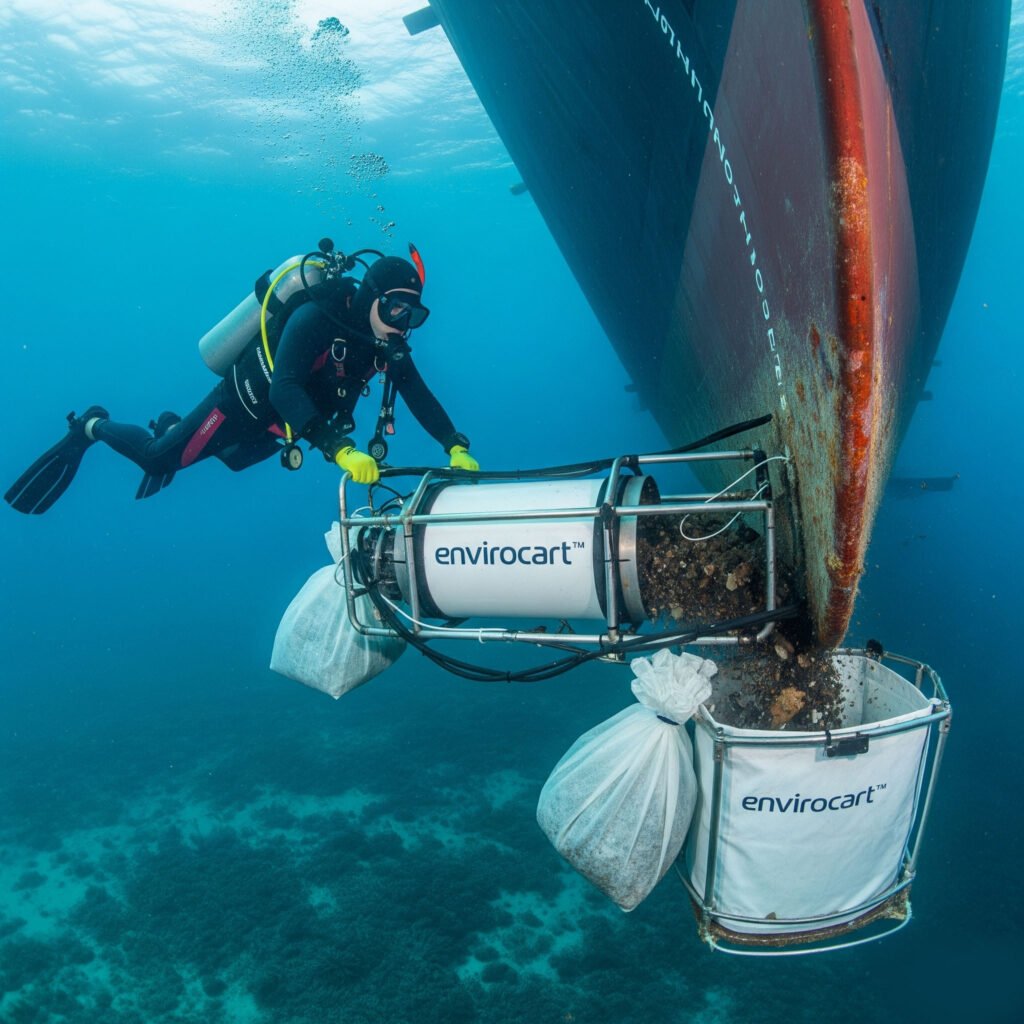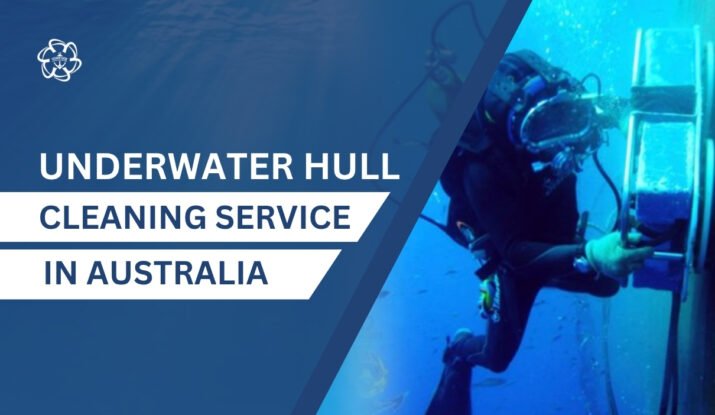Underwater Hull Cleaning in Australia: your premier provider of underwater and in-water cleaning services in Sydney and throughout Australia. We specialize in maintaining the performance and biosecurity of marine vessels through advanced hull cleaning and in-water cleaning techniques. Our services ensure your vessel operates efficiently, adheres to Australian regulations, and minimizes environmental impact.

What is Hull Clean?
Hull cleaning refers to the process of removing biofouling from a vessel’s hull. Biofouling is the accumulation of marine organisms on the hull, which can significantly impact a vessel’s performance. Hull cleaning, or marine cleaning, is essential for maintaining speed, reducing fuel consumption, and preventing the spread of invasive species in Australian territorial seas.
The Importance of Underwater Hull Cleaning in Australia
Underwater hull cleaning is critical for maintaining the efficiency and longevity of marine vessels. Regular hull cleaning helps reduce drag, which translates to lower fuel consumption and reduced emissions. Furthermore, underwater hull cleaning is vital for biosecurity, preventing the transfer of invasive species between different ports and maritime regions in Australia.
Effects of Biofouling on Marine Vessels
Biofouling has several detrimental effects on marine vessels. It increases drag, leading to higher fuel consumption and reduced speed. Biofouling can also damage the hull’s anti-fouling coating, necessitating costly repairs. Effective biofouling management through regular hull cleaning is essential for maintaining vessel performance and protecting marine ecosystems.
In-Water Cleaning Techniques

Overview of In-Water Cleaning Methods
In-water cleaning methods involve cleaning the hull of a vessel while it is still in the water. These methods range from manual cleaning by divers to the use of remotely operated vehicles (ROVs) equipped with specialized cleaning technology. In-water cleaning is a cost-effective alternative to dry-docking, allowing for quick and efficient hull maintenance in various ports, including Sydney and Queensland.
Advantages of In-Water Cleaning
In-water cleaning offers numerous advantages, including reduced downtime and lower costs compared to traditional dry-docking. It allows for regular maintenance of the hull and propeller, ensuring optimal vessel performance. Furthermore, in-water cleaning helps prevent the spread of invasive species by removing biofouling before it can establish itself in new environments.
Environmental Considerations for In-Water Cleaning
Environmental considerations are paramount in in-water cleaning. It’s crucial to comply with anti-fouling and in-water cleaning guidelines to minimize the impact on marine ecosystems. This includes using cleaning technology called the Envirocart™ system to capture and filter removed biofouling, preventing it from contaminating the surrounding waters. Underwater Hull Cleaning in Australia adheres to strict in-water cleaning standards to protect marine environments.
Biofouling Management
Understanding Biofouling
Biofouling presents a significant challenge to the maritime industry, impacting vessel efficiency and biosecurity. Understanding biofouling is crucial for effective hull clean practices. This involves recognizing the various marine organisms that contribute to biofouling and their attachment mechanisms. Comprehending the effects of biofouling allows for the development and implementation of targeted in-water cleaning strategies to mitigate its impact. This ultimately supports maintaining the health of Australian territorial seas.
Anti-Fouling Solutions and Their Importance
Anti-fouling solutions are vital for preventing biofouling on vessel hulls and propellers. These solutions range from anti-fouling coatings to advanced in-water cleaning technology. The importance of anti-fouling measures lies in their ability to reduce drag, lower fuel consumption, and prevent the spread of invasive marine species. Implementing effective anti-fouling strategies is essential for maintaining vessel performance and protecting marine ecosystems in Australia’s port environments. This is especially important when a vessel visits ports such as Sydney and Queensland.
Compliance with Australian Biofouling Management Guidelines

Compliance with Australian biofouling management guidelines is essential for all vessel operators. These guidelines, often aligned with IMO standards, outline best practices for hull cleaning and anti-fouling maintenance. Adhering to these guidelines ensures that in-water cleaning activities are conducted in an environmentally responsible manner, minimizing the risk of spreading invasive species. The Department of Agriculture plays a significant role in enforcing these in-water cleaning standards and promoting biosecurity across Australian ports.
Inspection and Certification Processes
Inspection Standards for Hull Cleaning
Inspection standards for hull cleaning are crucial for ensuring that cleaning activities are effective and environmentally sound. These standards outline the criteria for assessing hull cleanliness and the procedures for verifying compliance with in-water cleaning guidelines. Inspections are typically conducted by trained professionals, often clean subsea divers, who assess the level of biofouling remaining on the hull after cleaning. These inspections ensure that in-water cleaning activities meet the required environmental and performance standards. This also enables propeller cleaning.
Certification Requirements for Cleanliness
Certification requirements for cleanliness assure that a vessel’s hull meets the required anti-fouling standards after cleaning. These certifications are often required by port authorities and regulatory agencies to verify compliance with biosecurity regulations.
Obtaining certification typically involves a thorough inspection of the hull to ensure that all biofouling has been effectively removed. Vessels that meet the certification requirements demonstrate their commitment to environmental responsibility and biosecurity, which is essential for operating in Australian waters.
Role of Divers in Cleaning Inspections
Divers play a critical role in hull clean inspections. Equipped with specialized underwater hull cleaning technology, divers can perform detailed assessments of hull condition and cleanliness. They can identify areas of biofouling and verify the effectiveness of cleaning efforts. Divers can use technology, such as ROVs or Envirocart™, to efficiently clean the hull and capture any dislodged biofouling. Their expertise is essential for ensuring that vessels meet the required cleanliness standards and comply with biofouling management regulations across Australian ports, including Sydney.
In-Water Cleaning Standards and Guidelines
Overview of In-Water Cleaning Standards
In-water cleaning standards are a set of guidelines and regulations designed to ensure that hull clean activities are conducted in an environmentally responsible and effective manner. These standards address various aspects of in-water cleaning, including the types of cleaning methods used, the disposal of removed biofouling, and the protection of marine environments.
Adhering to these standards is crucial for minimizing the impact of cleaning activities on marine ecosystems and preventing the spread of invasive species. The International Maritime Organization (IMO) plays a key role in setting international in-water cleaning standards, while the Australian Department of Agriculture enforces these standards within Australian territorial seas and maritime regions.
Anti-Fouling and In-Water Cleaning Guidelines

Anti-fouling and in-water cleaning guidelines provide specific instructions and recommendations for preventing and managing biofouling on vessel hulls. By following these guidelines, vessel operators can effectively reduce biofouling, improve vessel performance, and minimize the risk of transferring invasive species between ports. Additionally, these guidelines help protect Australian biosecurity.
International Maritime Organization (IMO) Regulations
The International Maritime Organization (IMO) plays a crucial role in setting international standards for in-water cleaning and biofouling management. The IMO’s regulations and guidelines aim to prevent the spread of invasive marine species through effective hull clean practices. These regulations cover various aspects of vessel operations, including the application of anti-fouling coatings, the conduct of in-water cleaning activities, and the inspection of hulls for biofouling. Compliance with IMO regulations is essential for vessel operators to ensure they meet international in-water cleaning standards and contribute to biofouling management and the protection of marine ecosystems. The Australian Department of Agriculture also takes IMO regulations into account.
Choosing the Right Underwater Hull Cleaning in Australia
Factors to Consider When Selecting a Service
Selecting the right underwater hull cleaning in Australia requires careful consideration of several factors, including experience and expertise, compliance with in-water cleaning standards, environmental regulations, and the range of services offered. Cleaning technology called the Envirocart™ should be employed. Evaluating these factors will help you choose a service that effectively maintains your vessel and protects marine environments.
Benefits of Using Envirocart Services
Envirocart services offer several benefits for vessel operators in Sydney, including effective capture and removal of biofouling, compliance with environmental regulations, and improved vessel performance by reducing drag and fuel consumption. Using the Envirocart™ technology ensures compliance with environmental regulations and in-water cleaning standards. Choosing Envirocart services demonstrates a commitment to environmental responsibility and sustainable maritime practices.
This is especially important for vessels operating in sensitive marine environments around Australia.In conclusion, maintaining a clean hull is not only essential for optimal vessel performance but also a key responsibility for protecting Australia’s marine environments. From reducing fuel consumption and emissions to upholding strict biosecurity standards, underwater hull cleaning and in-water cleaning services play a pivotal role in sustainable maritime operations.
Conclusion

In conclusion, maintaining a clean hull is not only essential for optimal vessel performance but also a key responsibility for protecting Australia’s marine environments. From reducing fuel consumption and emissions to upholding strict biosecurity standards, underwater hull cleaning and in-water cleaning services play a pivotal role in sustainable maritime operations.
For those seeking efficient, eco-friendly, and regulation-compliant underwater hull cleaning in Australia and across Australia, Hull Clean Australia is your trusted partner. Learn more about environmentally responsible hull cleaning practices and solutions by visiting CleanShip.


